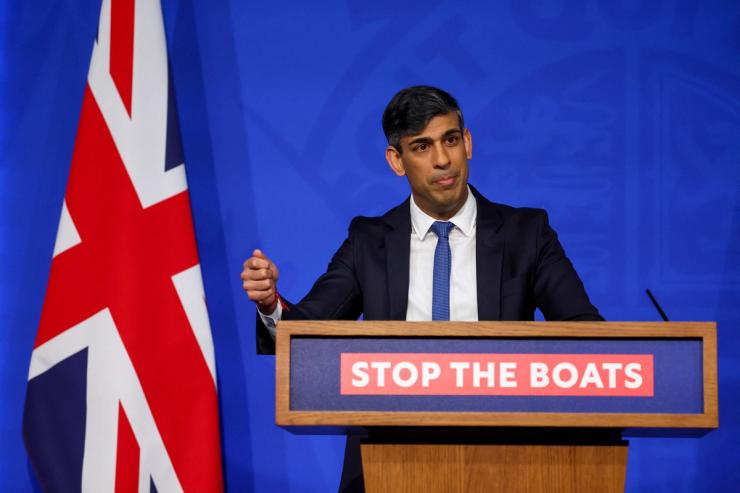The News
U.K. Prime Minister Rishi Sunak scored somewhat of a political win after the U.K. parliament on Monday passed his highly contested bill to deport asylum seekers to Rwanda, despite the country’s Supreme Court ruling it unconstitutional last year.
The bill’s passage follows days of debates between the House of Commons and the House of Lords over amendments to the draft law, which will see some asylum seekers who arrive illegally in the U.K. be sent to Rwanda to have their claims processed.
The legislation faced fierce political and legal challenges. Last November, the U.K.’s highest court said that Rwanda was not deemed a “safe” third country and sending refugees there would endanger their human rights.
In response, Sunak — who has staked his reputation on the legislation — introduced an emergency bill to prove that Rwanda was a safe country, which lawmakers passed with a majority, reviving the controversial policy.
MPs have been divided on the Rwanda deportation bill, which was first drafted in 2022 under Boris Johnson’s government. Moderates cautioned against the potential for human rights violations while nationalists thought it wasn’t enough of a deterrent to migrants crossing the English channel.
Around 6,000 people have made the journey to the U.K. via small boats so far this year. More than 100,000 asylum cases have been in limbo since London signed an agreement with Kigali in April 2022.
Britain has already paid Rwanda £240 million ($298 million), while Sunak’s government could hand over an additional £50 million after the bill’s passage, The Guardian said. According to The Times, other countries including Costa Rica, the Ivory Coast, and Armenia have also been considered as options if the Rwanda plan proves successful.
SIGNALS
Bill could be pivotal as UK election nears
Reducing immigration has been a core focus of Sunak’s Conservative government and is likely to be a central issue at the next general election. Sunak is required to call a vote by next January, with polls predicting that he will suffer a heavy defeat as the Labour party shows a commanding lead in polls. The Rwanda plan has exposed divisions within the Tories, with five right-wing caucuses within the party warning they would vote against the bill. Even with the bill’s passing, operational logistical details are still fuzzy, as “Mr. Sunak’s battle to get planes in the air and illegal migrants deported to Rwanda almost certainly won’t be [over].”
Asylum seekers feel like a ‘political football’
Asylum seekers, especially those who face the prospect of being forcibly removed to Rwanda, have said that they feel like a “political football,” The Guardian reported. “We want a feeling of stability and a sense of homeland but will not be able to get this in Rwanda,” an Egyptian asylum seeker told the outlet, while a Congolese asylum seeker said that the Rwanda does not have space for the influx and that the plan will further destabilize his home country, which shares a border with Rwanda. In Rwanda, locals have mixed reactions to the deal, which they say will bring in cash but strain resources. “This is a tiny, densely populated country with minimal or no access to basic opportunities,” one Kigali cafe owner told the BBC. “What happens if foreigners come in to compete for the same opportunities?”
Policy damages UK’s global reputation
“The policy may end up being remembered more as a political talking point than as a practical effort to curb the perilous crossings,” The New York Times wrote Monday. The law could be blocked by the European Court of Human Rights and be scrapped under the Labor Party which is ahead in the polls. Sunak has insisted that multiple charter flights will begin operating in 10 to 12 weeks, but even if they take off, countries already view the plan as “a massive reputational risk,” a professor of European politics told The Times.




